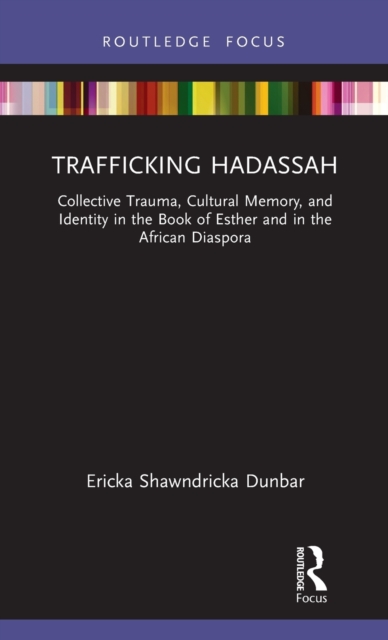Trafficking Hadassah: Collective Trauma, Cultural Memory, and Identity in the Book of Esther and in the African Diaspora

Trafficking Hadassah: Collective Trauma, Cultural Memory, and Identity in the Book of Esther and in the African Diaspora
The representation of sexual trafficking in the book of Esther has parallels with the cultural memories, histories, and materialized pain of African(a) girls and women across time and space, from the Persian Empire, to subsequent slave trade routes and beyond.
Trafficking Hadassah illuminates that Africana female bodies have been and continue to be colonized and sexualized, exploited for profit and pleasure, causing adverse physical, mental, sexual, socio-cultural, and spiritual consequences for the girls and women concerned. It focuses on sexual trafficking both in the biblical book of Esther and during the transatlantic slave trade to demonstrate how gender and racism intersect with other forms of oppression, including legal oppression, which results in the sexual trafficking of African(a) females. It examines both the conditions and mechanisms by which the trafficking of the virgin girls (who are collectively identified) are legitimated and normalized in the book of Esther, alongside contemporary histories of Africana females. This important book examines ideologies and stereotypes that are used to justify the abuse in both contexts, challenges the complicity of biblical readers and interpreters in violence against girls and women, and illustrates how attention to the nameless, faceless African girls in the text is impacted by the #MeToo and #SayHerName social movements.
This book will be of particular interest to those studying the Bible, religion, gender, theology, and sex trafficking. It is also an important book for those in the related fields of Africana Studies, Trauma Studies, Post-Colonial Studies, Diaspora Studies, Critical Race Studies, as well as to the general reader.
PRP: 402.69 Lei
Acesta este Prețul Recomandat de Producător. Prețul de vânzare al produsului este afișat mai jos.
322.15Lei
322.15Lei
402.69 LeiLivrare in 2-4 saptamani
Descrierea produsului
The representation of sexual trafficking in the book of Esther has parallels with the cultural memories, histories, and materialized pain of African(a) girls and women across time and space, from the Persian Empire, to subsequent slave trade routes and beyond.
Trafficking Hadassah illuminates that Africana female bodies have been and continue to be colonized and sexualized, exploited for profit and pleasure, causing adverse physical, mental, sexual, socio-cultural, and spiritual consequences for the girls and women concerned. It focuses on sexual trafficking both in the biblical book of Esther and during the transatlantic slave trade to demonstrate how gender and racism intersect with other forms of oppression, including legal oppression, which results in the sexual trafficking of African(a) females. It examines both the conditions and mechanisms by which the trafficking of the virgin girls (who are collectively identified) are legitimated and normalized in the book of Esther, alongside contemporary histories of Africana females. This important book examines ideologies and stereotypes that are used to justify the abuse in both contexts, challenges the complicity of biblical readers and interpreters in violence against girls and women, and illustrates how attention to the nameless, faceless African girls in the text is impacted by the #MeToo and #SayHerName social movements.
This book will be of particular interest to those studying the Bible, religion, gender, theology, and sex trafficking. It is also an important book for those in the related fields of Africana Studies, Trauma Studies, Post-Colonial Studies, Diaspora Studies, Critical Race Studies, as well as to the general reader.
Detaliile produsului









